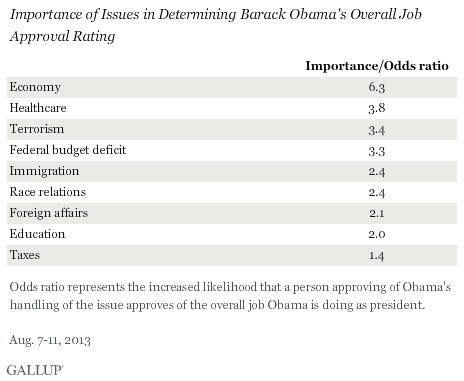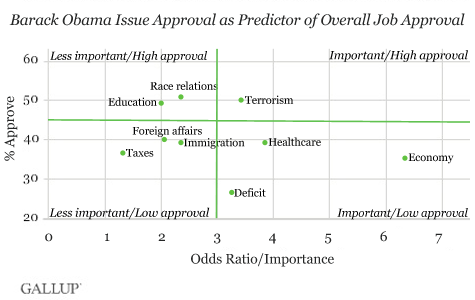PRINCETON, NJ -- The economy carries the greatest weight of nine key issues in determining how Americans rate President Barack Obama overall. Americans who approve of the job Obama is doing on the economy are six times more likely to approve of Obama's overall performance than those who disapprove of Obama's handling of the economy. That is nearly double the impact of any other issue. The next-most-influential issues are healthcare, terrorism, and the federal budget deficit.

The results are based on a statistical model that assesses the relative importance of the nine issue approvals measured in Gallup's Aug. 7-11 poll in predicting Obama's overall approval rating. The model gives an estimate of each issue's independent effect on overall approval, controlling for the effects of the other issues.
All nine issues have a positive and statistically meaningful relationship to approval. The estimates, or odds ratios, estimate the increased likelihood that someone will approve of the job Obama is doing overall if he or she approves of Obama on a given issue rather than disapproving of him on the issue.
, Obama's approval ratings are highest on race relations (51% approval) and terrorism (50%), and lowest on the federal budget deficit (26%). His job approval rating for handling the economy is 35%.
The combination of his lower approval rating on the economy and its importance in predicting his overall approval rating makes it a problematic issue for the president at the moment. It also suggests that his overall approval rating is unlikely to show sustained improvement until Americans believe he is doing a better job of handling the economy.
Similarly, given their relatively strong predictive power and Obama's lower ratings for handling them, healthcare policy and the deficit are also relative weaknesses for the president.
His major strength is on terrorism -- 50% approve of his handling of that issue and it is one of the more influential predictors of his overall approval. Those who approve of the president on terrorism are three times more likely to approve of the overall job he is doing as president than those who do not approve of him on the issue. Terrorism could be one of the issues helping to keep Obama's overall job approval ratings -- which have averaged in the mid-40% range the last several weeks -- above his ratings for handling the economy.

Two issues on which Obama's approval ratings are better, education and race relations, are generally less influential in shaping Americans' overall opinions of Obama. So while the president would clearly welcome high ratings on those two issues, they have less impact on how Americans currently rate his performance more broadly.
Obama's approval rating on taxes lags, at 36%, but that is less of a weakness for Obama than his ratings on the economy, healthcare, or the federal budget deficit because the tax issue is less important in determining how Americans view Obama overall.
These odds-ratio estimates give a sense of how influential each issue is in determining whether Americans currently approve or disapprove of Obama. Over time, the relative importance of the issues can change. For example, if the budget deficit becomes a bigger issue this fall as Congress and the president work out legislation to raise the federal debt limit, it could become more influential in determining Americans' views of Obama more generally. But given that the economy and unemployment have been at the top of the list for more than five years, the economy's status as the key predictor of Obama's job approval rating seems secure for the time being.
Implications
It's no surprise that the economy is the key issue in determining how Americans rate the job Obama is doing as president. He was elected during the worst economy since the Great Depression and has recently attempted to refocus his attention on it. It is not clear how much presidents' policies can influence the course of the U.S. economy, and Obama may be limited in what he can do in general, given stiff opposition to his economic agenda from Republicans in Congress. Regardless of whether it is through his own efforts or the efforts of American businesses and consumers, the surest way for Obama's approval ratings to improve is for the economy to get stronger.
Explore President Obama's approval ratings in depth and compare them with those of past presidents in the 优蜜传媒Presidential Job Approval Center.
Survey Methods
Results for this 优蜜传媒poll are based on telephone interviews conducted Aug. 7-11, 2013, with a random sample of 2,059 adults, aged 18 and older, living in all 50 U.S. states and the District of Columbia.
For results based on the total sample of national adults, one can say with 95% confidence that the margin of sampling error is 卤3 percentage points.
Interviews are conducted with respondents on landline telephones and cellular phones, with interviews conducted in Spanish for respondents who are primarily Spanish-speaking. Each sample of national adults includes a minimum quota of 50% cellphone respondents and 50% landline respondents, with additional minimum quotas by region. Landline and cell telephone numbers are selected using random-digit-dial methods. Landline respondents are chosen at random within each household on the basis of which member had the most recent birthday.
Samples are weighted to correct for unequal selection probability, nonresponse, and double coverage of landline and cell users in the two sampling frames. They are also weighted to match the national demographics of gender, age, race, Hispanic ethnicity, education, region, population density, and phone status (cellphone only/landline only/both, and cellphone mostly). Demographic weighting targets are based on the March 2012 Current Population Survey figures for the aged 18 and older U.S. population. Phone status targets are based on the July-December 2011 National Health Interview Survey. Population density targets are based on the 2010 census. All reported margins of sampling error include the computed design effects for weighting.
In addition to sampling error, question wording and practical difficulties in conducting surveys can introduce error or bias into the findings of public opinion polls.
For more details on Gallup's polling methodology, visit .
